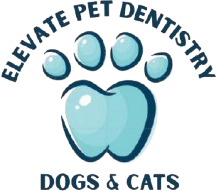
Don’t Let Misinformation Stand Between Your Pet and a Healthy Smile
Many pet parents don’t realize just how important dental health is for their furry family members. Oral health isn’t just about clean teeth—it impacts your pet’s overall health and longevity. Sadly, widespread myths about pet dentistry often lead to preventable issues like infections, tooth loss, and even heart or kidney disease.
Let’s clear up some of the most common pet dental care myths—and share helpful tips to keep your pet’s smile bright and healthy!
Myth #1: Pets Don’t Need Dental Care Like Humans
Reality: Just like humans, pets accumulate plaque and tartar. Without proper dental care, this can lead to gum disease, oral pain, infections, and even systemic illness as oral bacteria enter the bloodstream.
Takeaway: Preventive care—including brushing, dental home care, professional cleanings, and vet checkups—is key to maintaining your pet’s oral and overall health.
Myth #2: Bad Breath Is Normal for Pets
Reality: Persistent bad breath isn’t normal—it’s usually a sign of underlying dental problems, such as gum disease, tooth decay, infection, or even oral tumors.
Takeaway: If your pet’s breath is consistently unpleasant, it’s time for a veterinary dental exam to pinpoint the cause and treat it early.
Myth #3: Dry Kibble Cleans Your Pet’s Teeth
Reality: While dry kibble may help remove some debris, it doesn’t remove plaque, which is a sticky biofilm that hardens into tartar within 24–48 hours if not brushed away.
Takeaway: Use pet-safe toothpaste, approved dental chews, and schedule regular cleanings under anesthesia for real protection against plaque and tartar.
Myth #4: Chew Toys and Bones Are Enough for Dental Health
Reality: Chews can help reduce plaque, but they can’t replace brushing or exams. Some bones and hard toys even risk causing fractured teeth or choking.
Takeaway: Use dental products approved by the VOHC and keep a balanced routine of brushing, chews, and veterinary dental care.
Myth #5: Pets Clean Their Own Teeth—Like in the Wild
Reality: Domesticated pets eat processed food and live different lifestyles than their wild counterparts. They lack natural cleaning behaviors like tearing through raw hide or bones.
Takeaway: Your pet needs a routine dental care regimen designed for modern pets—daily brushing, professional cleanings, and regular checkups.
Myth #6: If a Pet Eats Normally, Their Teeth Must Be Fine
Reality: Pets are masters at hiding pain, including dental pain. Many pets will eat and behave normally even with serious issues like loose teeth or infected gums.
Takeaway: Watch for subtle signs like bad breath, drooling, pawing at the mouth, or chewing on one side. Annual dental evaluations can detect hidden problems before they worsen.
Myth #7: Anesthesia-Free Cleanings Are Safer
Reality: Anesthesia-free cleanings only remove visible surface plaque and cannot clean under the gumline or detect hidden issues. Without anesthesia, procedures are often stressful, incomplete, and potentially harmful.
Takeaway: Anesthesia is essential for safe, thorough dental exams, X-rays, and treatments. At Elevate Pet Dentistry, we use advanced, tailored anesthesia protocols to keep your pet comfortable and safe.
Myth #8: Home Remedies Are a Substitute for Professional Cleanings
Reality: Some home remedies may temporarily freshen breath but do nothing for gum disease, tartar, or infection—and some may even be harmful.
Takeaway: Stick to veterinarian-approved products and schedule regular professional cleanings and evaluations for lasting dental health.
Myth #9: Brushing Isn’t Necessary
Reality: Brushing is the most effective way to remove plaque and prevent tartar buildup. Without it, even the best chews and diets can’t prevent dental disease alone.
Takeaway: Aim for daily brushing with pet-specific toothpaste. Start slow, make it positive, and turn it into a healthy habit!
Myth #10: Puppies and Kittens Don’t Need Dental Care
Reality: Dental care should begin early! Starting tooth brushing in puppyhood or kittenhood helps build lifelong habits and allows early detection of alignment or bite issues.
Takeaway: Begin brushing as soon as your pet comes home. Ask your vet to check for retained baby teeth, misalignment, or jaw concerns at their early visits.
Final Thoughts
Dental myths can delay care and put your pet’s health at risk. The truth is: regular veterinary dental care, safe anesthetic cleanings, and home hygiene are the cornerstones of oral and whole-body health.
At Elevate Pet Dentistry, we’re here to partner with you in protecting your pet’s smile—for life.
Need help getting started? Schedule a dental consultation or ask us about personalized dental care options today!
